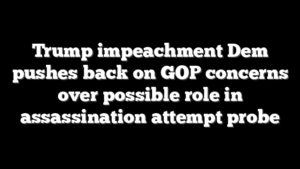
Harris says US will land ‘international astronaut’ on the moon by the end of the decade
Vice President Kamala Harris announced Wednesday that the United States will land an “international astronaut” along with Americans on the moon by the end of the decade.
Speaking at the third convening of the U.S. National Space Council under the Biden administration, Harris addressed the “importance of international collaboration on human space exploration,” noting how the Artemis program “is the most ambitious space exploration effort in generations.”
“For the first time in more than half a century, the United States will return astronauts to the lunar surface. We will establish the first lunar base camp and the first station in lunar orbit — all of this in collaboration with our allies and partners,” Harris said. “For example, the service module that will help carry Artemis astronauts to the Moon was built by the European Space Agency. And Europe, Japan, and Canada will make significant contributions to the lunar space station.”
“Today, in recognition of the essential role that our allies and partners play in the Artemis program, I am proud, then, to announce that alongside American astronauts, we intend to land an international astronaut on the surface of the moon by the end of the decade,” the vice president said. “This announcement and this meeting of our National Space Council is further demonstration of our belief in the critical importance of international partnership… I believe we are all here together because we agree space is a place of extraordinary opportunity. So, our task – dare I say our duty – as nations must be to work together to make that opportunity real and to preserve it for future generations.”
WHAT’S INSIDE THE MOON? MYSTERIES THAT ARE STILL BEING DECODED
The council made no mention of who the international moonwalker might be or even what country would be represented, according to The Associated Press. A NASA spokeswoman later said that crews would be assigned closer to the lunar-landing missions, and that no commitments had yet been made to another country.
The move comes as the United States believes China is preparing for potential battles in orbit, according to Politico.
NASA has long stressed the need for global cooperation in space, establishing the Artemis Accords along with the U.S. State Department in 2020 to promote responsible behavior not just on the moon, but everywhere in space. Representatives from all 33 countries that have signed the accords so far were expected at the space council’s meeting in Washington.
“We know from experience that collaboration on space delivers,” Secretary of State Antony Blinken said, citing the Webb Space Telescope, a U.S., European and Canadian effort.
Blinken also noted that “new challenges have arisen, including from our strategic competitors,” but he did not specify countries.
The establishment of the Artemis Accords is viewed as a challenge to China’s International Lunar Research Station project, which aims to establish a coalition of nations to build a permanent base on the moon next decade. Russia and Venezuela are among the several countries that have signed on.
Russia is a partner with NASA in the International Space Station, along with Europe, Japan and Canada. Even earlier in the 1990s, the Russian and U.S. space agencies teamed up during the shuttle program to launch each other’s astronauts to Russia’s former orbiting Mir station.
NASA has included international astronauts on trips to space for decades.
THE SPACE SHUTTLE CHALLENGER DISASTER OF 1986 SHOOK THE FOUNDATIONS OF SPACE EXPLORATION
Canadian Jeremy Hansen will fly around the moon roughly a year from now as part of the Artemis II mission with three U.S. astronauts. Another crew would actually land; it would be the first lunar touchdown by astronauts in more than a half-century. That is not likely to occur before 2027, according to the U.S. Government Accountability Office.
All 12 moonwalkers during NASA’s Apollo program of the 1960s and 1970s were U.S. citizens. The space agency’s new moon exploration program is named Artemis after Apollo’s mythological twin sister. Including international partners “is not only sincerely appreciated, but it is urgently needed in the world today,” Hansen told the council.
Wednesday was also the fourth anniversary of the establishment of the U.S. Space Force. Former President Trump established it as the first new branch of the armed services since 1947.
During Wednesday’s meeting, Harris also announced new policies to ensure the safe use of space as more and more private companies and countries aim skyward. Among the issues that the U.S. is looking to resolve: the climate crisis and the growing amount of space junk around Earth. A 2021 anti-satellite missile test by Russia added more than 1,500 pieces of potentially dangerous orbiting debris, and Blinken joined others at the meeting in calling for all nations to end such destructive testing.
The Associated Press contributed to this report.
Latest Political News on Fox News








